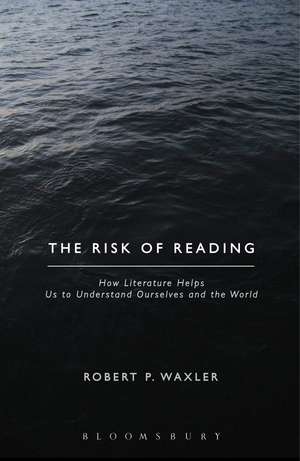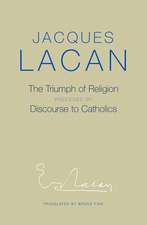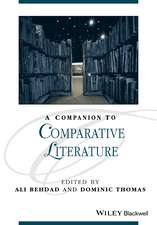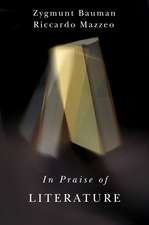The Risk of Reading: How Literature Helps Us to Understand Ourselves and the World
Autor Professor Robert P. Waxleren Limba Engleză Paperback – 19 noi 2014
| Toate formatele și edițiile | Preț | Express |
|---|---|---|
| Paperback (1) | 190.06 lei 3-5 săpt. | |
| Bloomsbury Publishing – 19 noi 2014 | 190.06 lei 3-5 săpt. | |
| Hardback (1) | 712.90 lei 6-8 săpt. | |
| Bloomsbury Publishing – 19 noi 2014 | 712.90 lei 6-8 săpt. |
Preț: 190.06 lei
Preț vechi: 221.76 lei
-14% Nou
Puncte Express: 285
Preț estimativ în valută:
36.37€ • 38.89$ • 30.32£
36.37€ • 38.89$ • 30.32£
Carte disponibilă
Livrare economică 27 martie-10 aprilie
Preluare comenzi: 021 569.72.76
Specificații
ISBN-13: 9781623563578
ISBN-10: 1623563577
Pagini: 200
Dimensiuni: 140 x 216 x 18 mm
Greutate: 0.27 kg
Editura: Bloomsbury Publishing
Colecția Bloomsbury Academic
Locul publicării:New York, United States
ISBN-10: 1623563577
Pagini: 200
Dimensiuni: 140 x 216 x 18 mm
Greutate: 0.27 kg
Editura: Bloomsbury Publishing
Colecția Bloomsbury Academic
Locul publicării:New York, United States
Caracteristici
Discusses the profound importance of stories to our sense of identity and self-knowledge
Notă biografică
Robert P. Waxler is Professor of English at the University of Massachusetts Dartmouth, USA. Co-Founder and Co-Leader of the Changing Lives Through Literature Program, a nationally recognized alternative sentencing program for criminal offenders.
Cuprins
AcknowledgementsChapter One: Story and Real LifeChapter Two: The Creation StoryChapter Three: Frankenstein Chapter Four: Alice in Wonderland Chapter Five: Heart of DarknessChapter Six: The Old Man and the SeaChapter Seven: Catcher in the RyeChapter Eight: One Flew Over the Cuckoo's NestChapter Nine: Fight ClubChapter Ten: The Sense of an EndingChapter Eleven: The Future of Linguistic NarrativeBibliography
Recenzii
The Risk of Reading is a bracing polemic in an age of digital overload about the centrality of language, in its most inticate narrative and figurative forms, for forging human purpose. Waxler investigates what is essential in literature for reckoning with fundamental experiences of mortality and desire. This is its necessary risk.
Robert Waxler's The Risk of Reading makes a persuasive case for the significance of literary reading to human life and understanding. In the first chapter, Waxler argues the value of 'deep reading' of literature as a way to journey to new worlds, observing that readers who take the risk also reap the rewards which come from engaging with story and the rich language of narrative. He then guides his readers on a series of journeys through literary works that well illustrate the importance of literature as initiating a deep reading process. In the final chapter, Waxler suggests that the real 'risk of reading' lies in the risk of not reading, especially as electronic media beckon.
The Risk of Reading is a passionate and provocative account of why literature matters. Waxler provides a practical guide to major works of classic and popular fiction, from Frankenstein to Fight Club, and a powerful and sophisticated argument for the ethical and intellectual value of reading.
The Risk of Reading is a clarion call to protect and perpetuate a centuries old educational tradition of a 'deep reading' of the written literary masterpieces. Although an unintended consequence, that tradition is being threatened by the increasing number of bells and whistles of the current digital culture. The latter is grounded in visual images and sound bytes and does not involve self-reflection and the search for the meaning and purpose of our existence. We are not enjoined, however, to repudiate the digital culture. Instead, we are correctly reminded that there is no digital equivalent of the linguistic narrative in the works of Plato, St. Augustine, Shakespeare, Hemingway, Tolstoy and a legion of other literary giants. Professor Waxler has eloquently and profusely elaborated the uniquely human reality that it is impossible to exaggerate the power of stories, ideas and concepts to grab a mind and radically change the direction of a life.
Some books do not fit neatly into genre categories. J. David Pleins offers us an excellent example of a multidisciplinary work with In Praise of Darwin. It is part history, part literary critique, part philosophy, and part theology.
Waxler argues that in these speedy, image-saturated digital times we risk losing the habit of reading deeply. With chapters that act as companions to an array of novels, including Frankenstein, The Catcher in the Rye, and Fight Club, Waxler, a UMass Dartmouth English professor, argues that deep reading forces us to slow down and that losing ourselves in literature allows us to return to regular life with fresh eyes.
Waxler's newest book, [The Risk of Reading: How Literature Helps Us Understand Ourselves and the World], is a ground-breaking publication that 'explores some of the meaning and implications of modern life through the deep reading of significant books.'
Waxler has nine chapters in each of which he discusses a book that you might like to read, to open yourself to the kind of risk of deep reading that he has in mind. ... I found myself engaged by his discussions of them.
Reading properly, in Waxler's view, teaches us how much we do not know, not how much we know, about our mysterious universe and human interaction . Waxler is not attempting to imbue his readers with cultural literacy; rather, he's trying to teach them how to read deliberately . We shouldn't fail to recognize the skill with which Waxler dissects texts.
Robert Waxler's The Risk of Reading makes a persuasive case for the significance of literary reading to human life and understanding. In the first chapter, Waxler argues the value of 'deep reading' of literature as a way to journey to new worlds, observing that readers who take the risk also reap the rewards which come from engaging with story and the rich language of narrative. He then guides his readers on a series of journeys through literary works that well illustrate the importance of literature as initiating a deep reading process. In the final chapter, Waxler suggests that the real 'risk of reading' lies in the risk of not reading, especially as electronic media beckon.
The Risk of Reading is a passionate and provocative account of why literature matters. Waxler provides a practical guide to major works of classic and popular fiction, from Frankenstein to Fight Club, and a powerful and sophisticated argument for the ethical and intellectual value of reading.
The Risk of Reading is a clarion call to protect and perpetuate a centuries old educational tradition of a 'deep reading' of the written literary masterpieces. Although an unintended consequence, that tradition is being threatened by the increasing number of bells and whistles of the current digital culture. The latter is grounded in visual images and sound bytes and does not involve self-reflection and the search for the meaning and purpose of our existence. We are not enjoined, however, to repudiate the digital culture. Instead, we are correctly reminded that there is no digital equivalent of the linguistic narrative in the works of Plato, St. Augustine, Shakespeare, Hemingway, Tolstoy and a legion of other literary giants. Professor Waxler has eloquently and profusely elaborated the uniquely human reality that it is impossible to exaggerate the power of stories, ideas and concepts to grab a mind and radically change the direction of a life.
Some books do not fit neatly into genre categories. J. David Pleins offers us an excellent example of a multidisciplinary work with In Praise of Darwin. It is part history, part literary critique, part philosophy, and part theology.
Waxler argues that in these speedy, image-saturated digital times we risk losing the habit of reading deeply. With chapters that act as companions to an array of novels, including Frankenstein, The Catcher in the Rye, and Fight Club, Waxler, a UMass Dartmouth English professor, argues that deep reading forces us to slow down and that losing ourselves in literature allows us to return to regular life with fresh eyes.
Waxler's newest book, [The Risk of Reading: How Literature Helps Us Understand Ourselves and the World], is a ground-breaking publication that 'explores some of the meaning and implications of modern life through the deep reading of significant books.'
Waxler has nine chapters in each of which he discusses a book that you might like to read, to open yourself to the kind of risk of deep reading that he has in mind. ... I found myself engaged by his discussions of them.
Reading properly, in Waxler's view, teaches us how much we do not know, not how much we know, about our mysterious universe and human interaction . Waxler is not attempting to imbue his readers with cultural literacy; rather, he's trying to teach them how to read deliberately . We shouldn't fail to recognize the skill with which Waxler dissects texts.
















